Discover folk - the CRM for people-powered businesses
In 2025, private equity firms face the ever-increasing challenge of managing complex investor relationships and navigating the intricacies of deal flow. To stay ahead of the curve, it's become necessary to leverage the best CRM (Customer Relationship Management) solutions designed specifically for this industry.
But with a lot of options available, how can you ensure that you're selecting the right one for your firm's unique needs?
In this blog post, we unpack:
- Top private equity CRMs for 2025
- Essential features to prioritize
- How to choose a CRM that fits your firm
Top Private Equity CRM Solutions in 2025
👉🏼 Try folk now to organize your deal flow and never miss a follow-up
Best fit at a glance
- folk CRM: Mid-sized teams (20–50) needing speed, simplicity, and fast adoption
- Affinity: Firms prioritizing relationship intelligence and sourcing
- DealCloud: Large, multi-office firms needing deep customization and compliance
- Salesforce: Firms with in-house tech wanting maximum platform flexibility
- Dynamo: PE firms seeking a comprehensive, stable suite
folk CRM
Overview
folk CRM is a modern relationship management platform built for agile teams, including private equity firms of 20-50 people looking for simplicity, efficiency, and fast adoption. It blends a sleek, intuitive interface with AI-powered automations, smart workflows, and customizable templates, making it ideal for mid-sized PE firms that want to focus more on sourcing and managing deals rather than configuring complex systems.
Unlike traditional CRMs, folk is designed to be deployed in hours, not months, offering a light yet powerful structure for PE teams who value speed and personalization. For firms with 20-50 team members, folk provides the perfect balance of functionality and simplicity without the overhead of enterprise-grade systems.
Pros
- Extremely fast to set up and easy to use
- Smart workflows powered by AI (e.g., follow-up reminders, automated sequences)
- Clean, modern UI that reduces friction
- Powerful integrations (Google Workspace, LinkedIn, Zapier, APIs)
- Highly customizable without coding
- Very affordable compared to traditional PE CRMs
- Excellent customer support and onboarding assistance
Cons
- Newer player compared to legacy systems (lower brand awareness)
- Some advanced reporting features may require third-party integrations
- Less suited for extremely large PE firms with complex multi-entity structures
Pricing
- Standard Plan: $20/user/month (billed yearly)
- Premium Plan: $40/user/month (billed yearly)
- No hidden fees, no setup costs.
👉🏼 Try folk now to deploy a PE-ready CRM in hours with AI automations
Affinity CRM
Overview
Affinity CRM is a relationship intelligence platform originally built for venture capital firms but increasingly adopted by private equity players. Its strength lies in its ability to automatically capture and map interactions across emails, meetings, and networks, giving deal teams deep insights into the strength of their relationships without manual data entry.
Affinity focuses heavily on AI and automation to streamline deal sourcing and tracking.
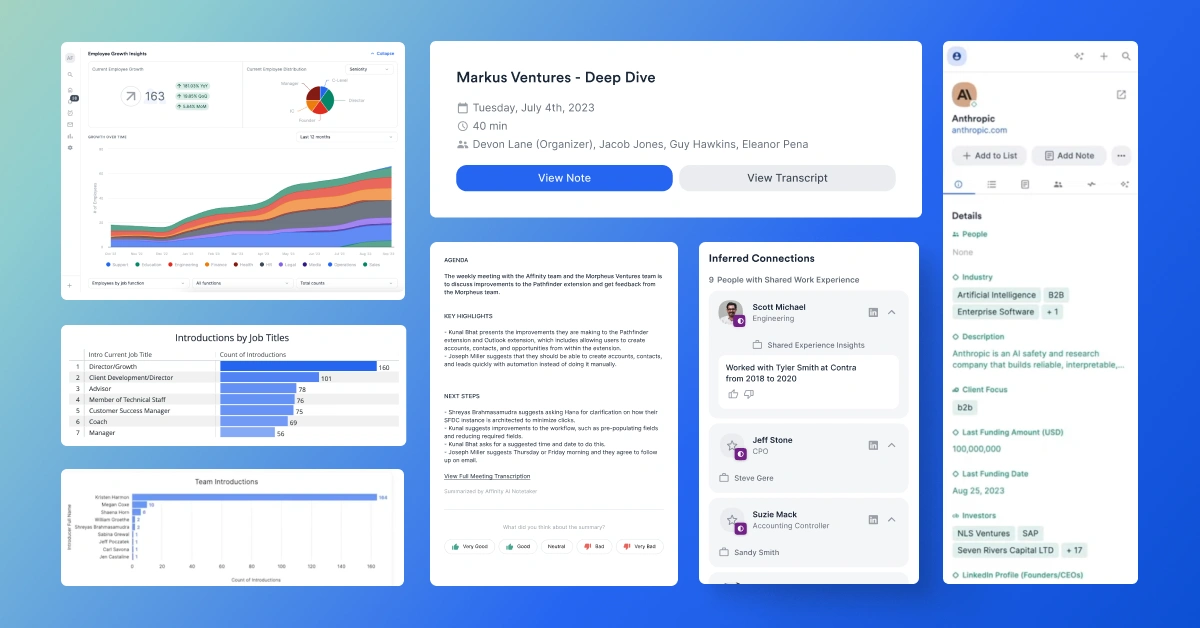
Pros
- Automatic data capture and relationship mapping
- Deep relationship analytics powered by AI
- User-friendly interface with minimal learning curve
- Integrates well with Google and Microsoft ecosystems
- Advanced network intelligence (e.g., warm intro suggestions)
Cons
- Expensive for small and mid-sized PE firms
- Less customizable compared to traditional CRMs
- Primarily designed for deal sourcing — not full investment management
- Limited reporting and analytics beyond relationships
Pricing
- Starting at approximately $2,000–$2,700/user/year
- Custom enterprise plans available for larger teams.
DealCloud
Overview
DealCloud is a powerful CRM and deal management platform built specifically for private equity, investment banking, and real estate firms. Known for its high degree of customization, it offers deep capabilities in pipeline management, compliance tracking, fundraising, and portfolio monitoring.
It's a robust enterprise-grade solution that can scale with complex and multi-office investment organizations — but it comes at a premium.
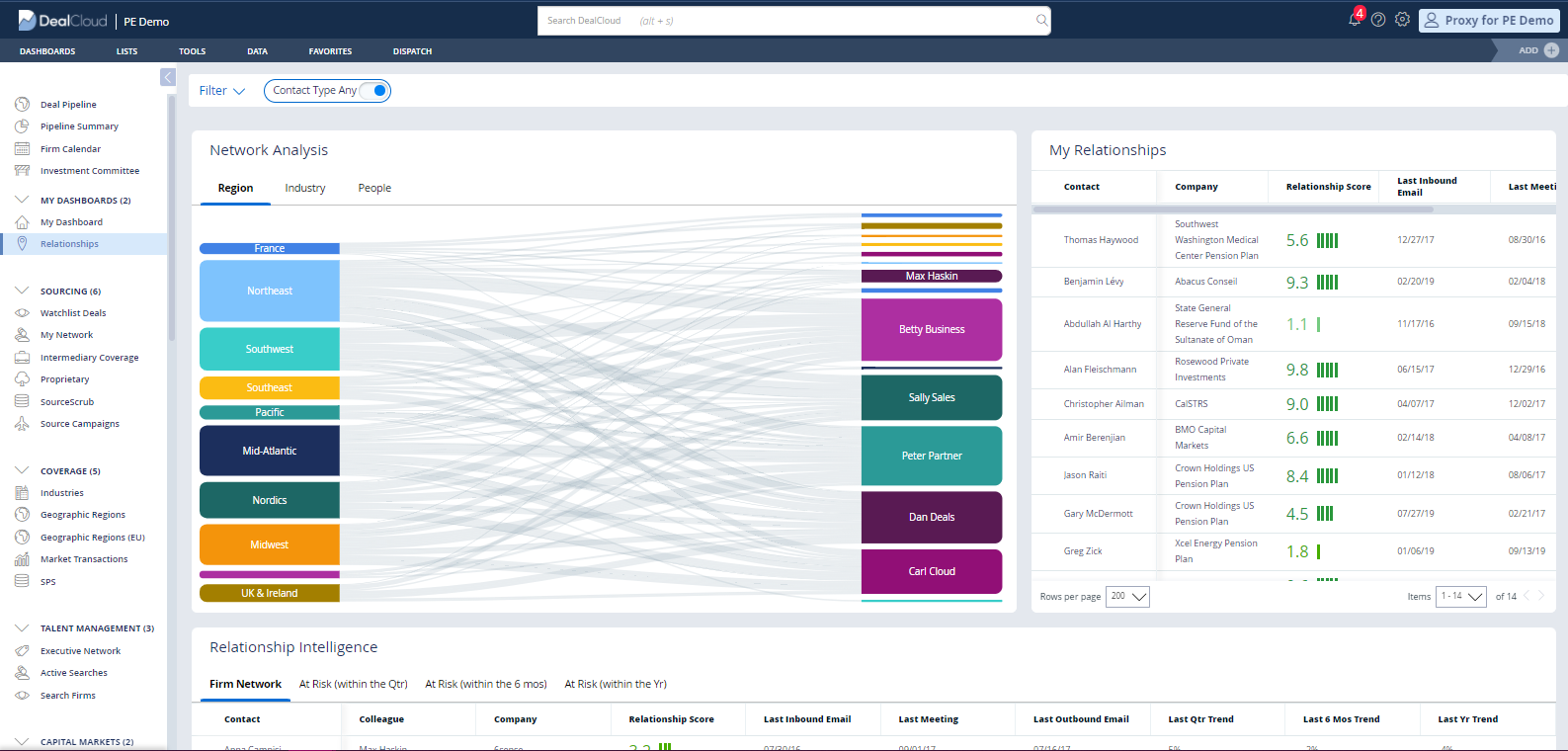
Pros
- Built specifically for private capital markets
- Highly customizable fields, dashboards, and workflows
- Strong regulatory compliance and audit capabilities
- Enterprise-grade security and access controls
- Detailed portfolio monitoring tools
Cons
- Extremely high cost of ownership
- Long implementation times (can take months)
- Requires technical consultants for customization and maintenance
- UX can feel outdated compared to newer, lightweight CRMs
- Complex for smaller PE firms without dedicated IT resources
Pricing
- Custom pricing, generally starting from $100,000+/year
- Implementation fees and ongoing support services usually apply.
Salesforce (for Private Equity)
Overview
Salesforce, one of the world's leading CRM platforms, offers extensive customization possibilities for private equity firms through its Sales Cloud and specialized Financial Services Cloud. With Salesforce, firms can build tailored deal pipelines, fundraising tracking systems, and LP engagement models.
However, Salesforce is a heavy platform that requires significant resources to set up, customize, and maintain — it's often better suited to larger firms with in-house tech teams.

Pros
- Extremely flexible and scalable for PE workflows
- Massive integration ecosystem (apps, APIs, services)
- Powerful reporting, dashboards, and analytics
- Strong mobile app and global accessibility
- Huge community and certified Salesforce consultants worldwide
Cons
- Requires heavy customization to fit PE-specific needs
- High total cost of ownership (licenses + consultants)
- Setup and iteration cycles can be slow
- Complexity can overwhelm smaller teams
Pricing
- Sales Cloud Essentials: From $25/user/month
- Additional costs for Financial Services Cloud, AppExchange apps, consulting, and ongoing support.
Dynamo CRM
Overview
Dynamo CRM is a longstanding CRM and investment management platform catering specifically to private equity, venture capital, and real estate firms. It provides a comprehensive suite for managing fundraising, deal sourcing, investor relations, and portfolio monitoring.
While Dynamo is trusted for its depth and stability, its interface and user experience feel somewhat outdated compared to newer, modern CRMs.
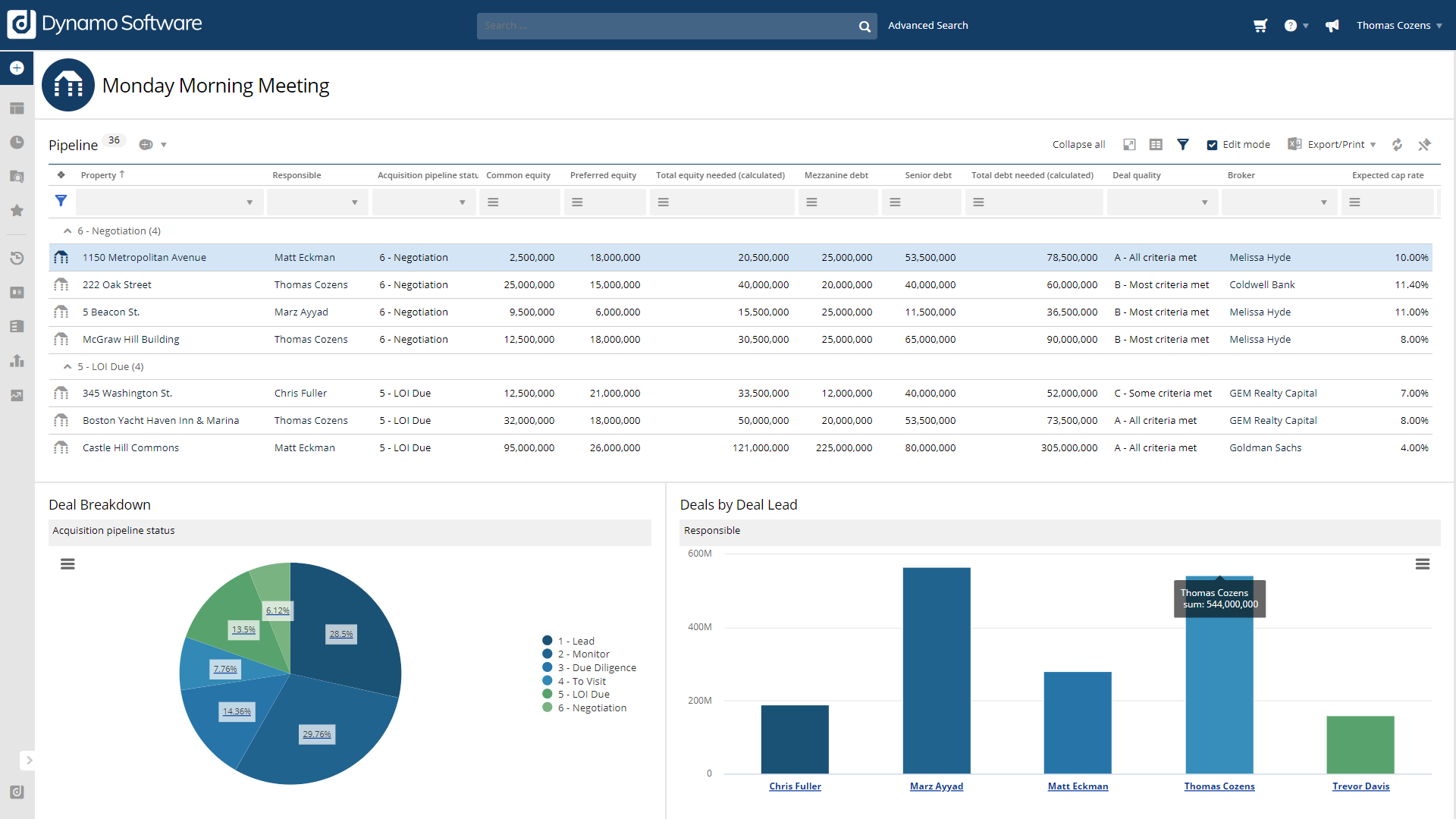
Pros
- Purpose-built for alternative asset management
- Solid fundraising and LP management features
- Strong reporting and analytics capabilities
- Good security and regulatory compliance
- Highly experienced in servicing the PE industry
Cons
- Clunky and dated user interface
- Less intuitive compared to modern competitors
- Longer learning curve for new users
- Less innovation in automation and AI
Pricing
- Starting around $7,500/year for small teams
- Custom quotes for larger or more complex needs.
Understanding Private Equity CRM
The private equity landscape is characterized by long deal cycles, high stakes negotiations, and the need to foster and maintain key relationships with investors. Private equity CRM software is essential for managing these complex relationships, streamlining workflows, and improving overall performance. It serves as a centralized platform for data management and valuable insights, catering specifically to the unique needs of private equity firms.
The best private equity CRMs offer a range of benefits, including:
- Streamlined operations
- Increased transparency
- Automated processes
- Improved collaboration
- Enhanced investor experience
- Better insights
- Improved security
By leveraging the right CRM solution, private equity firms can stay ahead in the competitive market, drive growth, and manage investor relations effectively.
The Role of CRM in Private Equity
CRM plays a pivotal role in private equity by automating manual processes, enhancing investor relations, and providing a single source of truth for data and insights. This allows firms to focus on their core competencies while ensuring that they have the tools necessary to manage their relationships effectively. By incorporating features like deal management, investor relationship management, and data visualization, the best private equity CRMs help firms navigate the complex world of investment management more efficiently.
End-to-end deal management in private equity CRM, for instance, assists firms in managing their entire investment process from inception to completion, including due diligence, portfolio management, data entry, and reporting returns on investments. This allows private equity firms to gain better control over their investment processes and make more informed decisions in a timely manner.
Another essential benefit is the ability to maintain strong connections with investors and manage fund performance effectively. By tracking communications and providing insights into investor performance, private equity CRM solutions enable firms to establish and maintain long-term relationships with their investors, which is crucial for the success and growth of the firm.
Essential Features of Top Private Equity CRM Systems
Top private equity CRM systems should have essential features such as:
- Deal flow management
- Investor relationship management
- Data visualization and reporting
- Email marketing
- Integration and customization options
These CRM solutions enable firms to manage their complex relationships more effectively, automate tedious processes, and make better-informed decisions. For private equity firms with teams of 20-50 people, folk CRM stands out as the ideal solution, offering the perfect balance of powerful features and ease of use without the complexity of enterprise-level platforms.
Deal Flow Management
Deal flow management in private equity CRM helps filter and track deals based on investment history, asset type, and deal size, ensuring efficient deal sourcing and execution. By providing a centralized platform for managing the progression of deals from initial contact to closure, private equity CRM solutions enable firms to monitor the status of deals, manage contacts, and provide insights into the performance of deals.
With efficient deal flow management, private equity firms can:
- Streamline their deal sourcing process
- Make more informed decisions about which deals to pursue
- Ultimately lead to better investment outcomes
- Help firms deploy capital more effectively
- Drive growth and improve overall performance.
Here is a view of folk's pipeline management feature
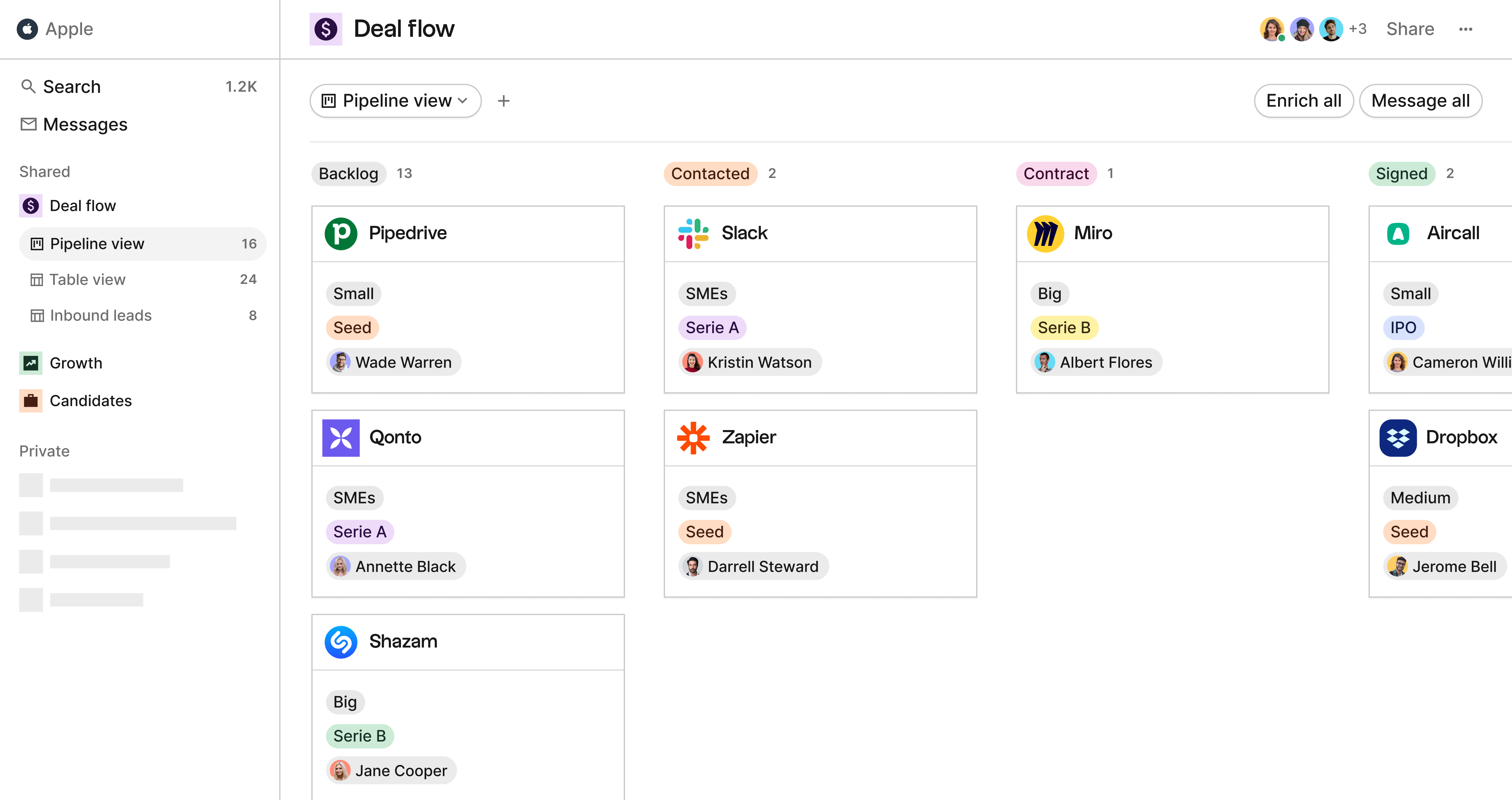
It also comes with an easy-to-use template.
Investor Relationship Management
Investor relationship management in private equity CRM allows firms to maintain strong connections with investors, track communications, and manage fund performance.
In many ways, this process mirrors customer relationship management, ensuring that the needs and expectations of investors are met and exceeded.
By maintaining strong investor relationships and offering transparent communication, private equity firms can build trust and loyalty with their investors, ultimately leading to better investment outcomes.

Data Visualization and Reporting
Data visualization and reporting features in private equity CRM enable firms to:
- Analyze and present relevant data in interactive charts and graphs for better decision-making
- Construct graphical representations of data to facilitate comprehension by users
- Decipher complex data and make informed decisions based on the insights provided
For example, pipeline visualization in private equity CRM allows firms to:
- Track the progress of due diligence and all activities within the deal flow pipeline
- Provide a clear overview of their investment processes
- Easily identify trends, patterns, and opportunities
- Make better-informed decisions
- Improve overall performance
With effective data visualization and reporting, private equity firms can optimize their investment strategies and achieve greater success.
It also comes down to calculating key funds metrics like % of capital deployment, ROI on investment, and more.
Email Marketing for Sourcing Opportunities & Investor Updates
Email marketing features in private equity CRM help source new opportunities and keep investors updated on portfolio performance and news. By leveraging the power of email marketing, private equity firms can reach out to potential acquisition targets, share relevant industry updates, and maintain an ongoing dialogue with their existing portfolio.
While some CRM solutions may have limited email marketing capabilities, others offer powerful tools for warm outreach, allowing firms to personalize their communications and build better relationships with their investors. By keeping investors informed and engaged, private equity firms can foster loyalty and trust, ultimately leading to better investment outcomes. Implementing contact management strategies can further enhance these relationships.
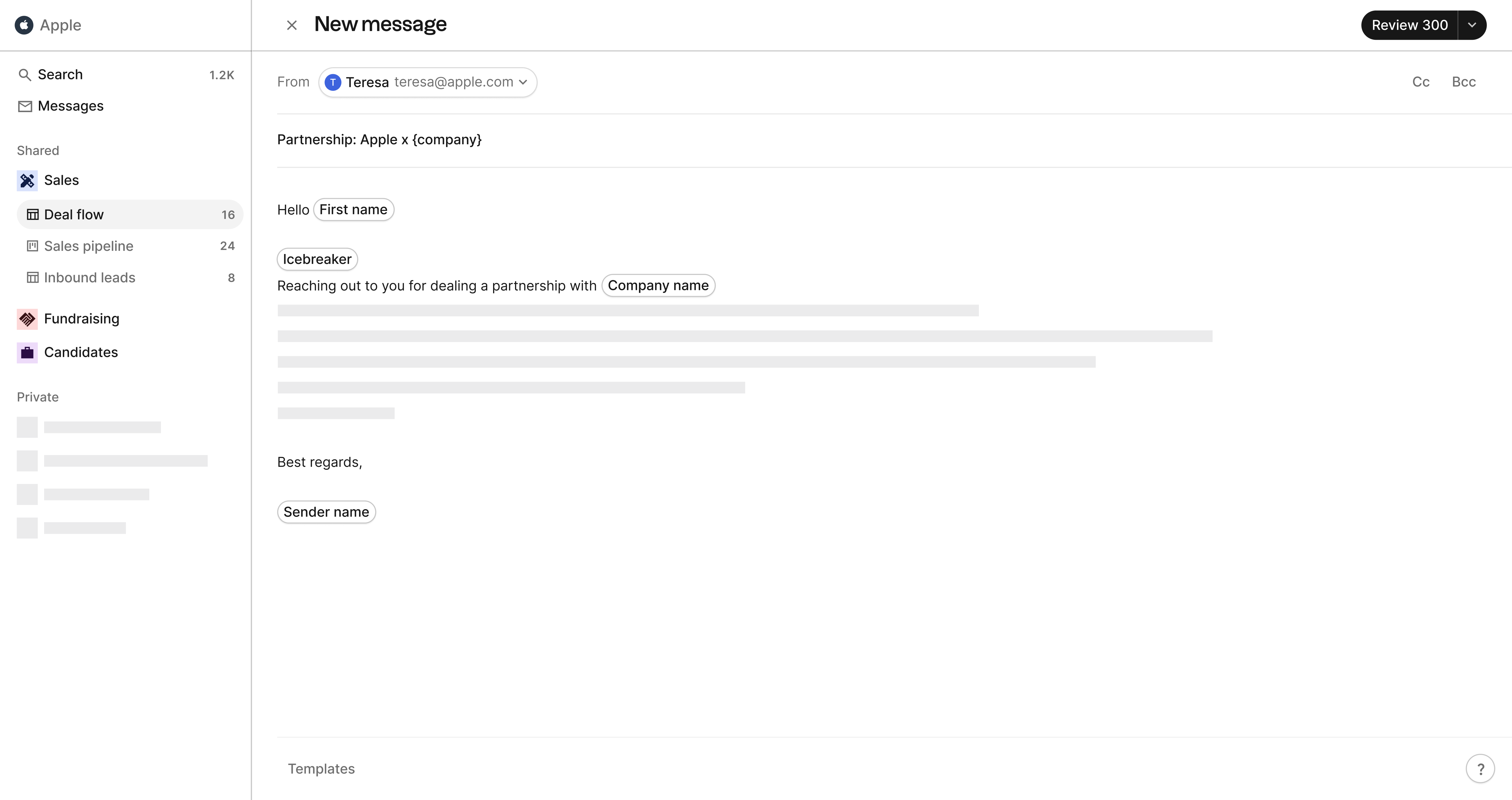
Integration and Customization
Integration and customization options in private equity CRM allow firms to tailor the software to their unique needs and connect with preferred apps and data sources. By offering a range of third-party integration tools and customization options, private equity CRM solutions enable firms to create a seamless experience that caters to their specific requirements.
Integrations are multiple but generally come down to a few categories
- Communication tools (Microsoft Outlook, Gmail, Google Calendar, etc)
- Email marketing tools (MailChimp, etc)
- Enrichment providers (Crunchbase, Pitchbook, Clearbit, etc)
The best private equity CRMs, including the best private equity CRM, equip firms with the tools they need to streamline their processes and improve overall performance. Customization options, such as adding columns to visualized dashboards, ensure that the CRM solution is tailored to the firm's unique needs, allowing for a more efficient and effective workflow.
Choosing the Right CRM for Your Private Equity Firm
Choosing the right CRM for your private equity firm involves assessing your firm's requirements, comparing CRM solutions, and ensuring proper implementation and training. By taking the time to evaluate your firm's unique needs and requirements, you can identify the CRM solution that best aligns with your objectives and maximizes the potential for growth in the competitive world of investment management.
Comparing various CRM solutions based on features, pricing, and user reviews can help you make an informed decision when selecting the perfect CRM solution for your firm. For mid-sized private equity firms with 20-50 team members, folk CRM emerges as the clear winner, offering the optimal combination of functionality, ease of implementation, and cost-effectiveness without the complexity of enterprise solutions.
Additionally, ensuring successful implementation and training for your chosen CRM solution can help maximize its benefits and enhance your firm's overall performance, ultimately driving growth and success in the competitive world of private equity. An alternative here consists in opting for easy to implement CRM that comes with templates such as folk.app.
Assessing Your Firm's Requirements
To determine the most suitable CRM solution, it's crucial to assess your firm's unique needs and requirements. Consider factors like deal flow management, investor relationship management, and data visualization to ensure that the chosen CRM solution addresses all aspects of your firm's operations.
By thoroughly evaluating your firm's requirements, you can identify the CRM solution that best aligns with your objectives and maximizes the potential for growth in the competitive world of investment management. This will enable you to make better-informed decisions and improve overall performance, ultimately driving growth and success for your firm.
Comparing CRM Solutions
Once you have assessed your firm's requirements, it's essential to compare various CRM solutions based on features, pricing, and user reviews. By examining the different software options available, you can identify the most suitable CRM solution that fulfills the unique requirements of your business.
Take the time to research and analyze the pros and cons of each CRM solution, keeping in mind factors such as ease of use, customization options, and integration capabilities. By doing so, you can make an informed decision when selecting the perfect CRM solution for your firm, ensuring that it meets your specific needs and drives growth for your business.
Implementation and Training
Proper implementation and training of your chosen CRM solution can help maximize its benefits and enhance your firm's overall performance. To ensure that the CRM solution is implemented correctly and that your personnel are adequately trained, it's important to allocate sufficient time and resources to the process.
By investing in the successful implementation and training of your chosen CRM solution, you can ensure that it is adopted and utilized effectively by your team. This will enable your firm to:
- Streamline its processes
- Enhance investor relations
- Make better-informed decisions
- Ultimately drive growth and success in the competitive world of private equity.
Summary
In conclusion, choosing the right private equity CRM solution is critical for managing complex investor relationships and navigating the intricacies of deal flow. By assessing your firm's unique needs, comparing various CRM solutions, and ensuring proper implementation and training, you can maximize the benefits of your chosen CRM solution and drive growth for your firm in the competitive world of investment management. With the right CRM solution in place, your firm will be better equipped to succeed and thrive in the ever-evolving private equity landscape.
FAQ
What is a private equity CRM?
A private equity CRM is software to manage deal flow, LP relations, fundraising, and portfolio updates in one system. It centralizes contacts, emails, pipelines, tasks, and reporting to track opportunities, automate workflows, and maintain compliant records.
Which CRM do private equity firms use?
Common options include DealCloud, Salesforce, Dynamo, Affinity, and folk. Selection depends on firm size, needed customization, regulatory needs, budget, and deployment timeline.
How much does a private equity CRM cost?
Pricing varies: modern tools $20–$40/user/month; relationship-intelligence $2,000–$2,700/user/year; enterprise suites often $100k+/year; mid-market suites from ~$7,500/year. Budget for setup, consulting, integrations, and training.
How long does it take to implement a private equity CRM?
Lightweight CRMs can deploy in hours or days with minimal training; enterprise platforms often take weeks to months and may require consultants. Timeline depends on data migration, security reviews, customization, and user training.
Discover folk CRM
Like the sales assistant your team never had

